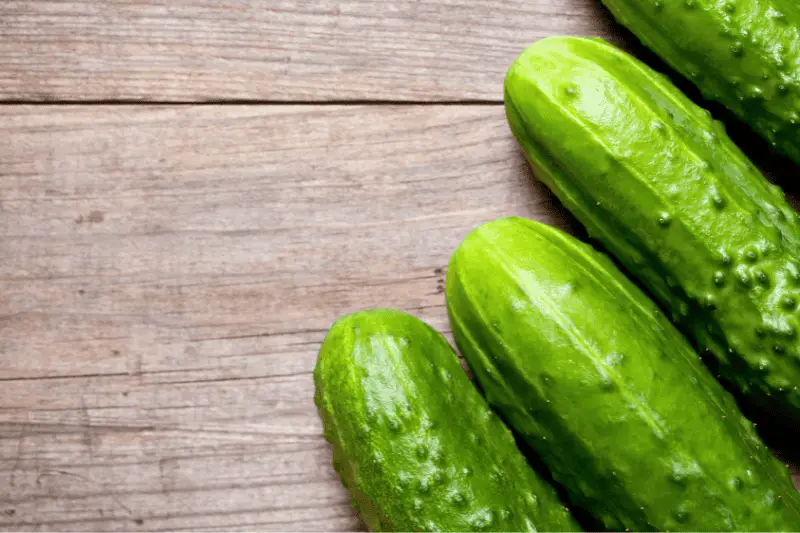Pickling is a time-honored tradition that preserves the flavors of fresh cucumbers, creating tangy and delicious pickles.
However, not all cucumbers are created equal when it comes to pickling. The best type of cucumber for pickling can make all the difference in the taste and texture of your pickles.
In this comprehensive guide, we will explore different cucumber varieties, their characteristics, and which ones are ideal for pickling.
Get ready to embark on a flavorful journey as we dive into the world of pickling cucumbers.

Best Type of Cucumber for Pickling
- Kirby Cucumbers: Kirby cucumbers, also known as pickling cucumbers, are one of the most popular choices for pickling. These small cucumbers are firm, crunchy, and have a bumpy skin, making them perfect for absorbing pickling brine. Kirby cucumbers are readily available in grocery stores and farmers’ markets, making them convenient for pickling enthusiasts.
- Persian Cucumbers: Persian cucumbers are another excellent option for pickling. These cucumbers are smaller in size, seedless, and have thin skins, which makes them ideal for pickling whole or slicing into spears. Persian cucumbers are known for their crisp texture and mild flavor, adding a delightful crunch to your pickles.
- English Cucumbers: Although commonly used for salads and fresh eating, English cucumbers can also be pickled. These cucumbers have a smooth skin, minimal seeds, and a sweet flavor. While they may not absorb flavors as readily as Kirby or Persian cucumbers, English cucumbers are a good choice if you prefer a milder pickle.
- Armenian Cucumbers: Armenian cucumbers, also called snake cucumbers, are long and slender with a ridged skin. While not as well-known as other varieties, Armenian cucumbers are great for pickling. They have a refreshing taste and a unique texture, adding a twist to your pickling adventures.
- Lemon Cucumbers: Lemon cucumbers are small, round cucumbers that resemble lemons in appearance. These cucumbers are perfect for pickling due to their crispness and delicate flavor. They add a burst of color and a hint of citrusy zest to your pickles, making them visually appealing and delightful to the taste buds.
- National Pickling Cucumbers: National pickling cucumbers are specifically bred for pickling. They are small, blocky, and have a bumpy skin. These cucumbers have a firm texture and a balanced flavor, ensuring that they absorb the pickling brine well. National pickling cucumbers are a reliable choice for achieving consistently delicious pickles.
- Boston Pickling Cucumbers: Boston pickling cucumbers, also known as homemade pickling cucumbers, are classic favorites for pickle enthusiasts. These cucumbers are short and blocky, with a thin skin and few seeds. They are crisp and flavorful, making them a popular choice for homemade pickles.
- Homemade Pickling Cucumbers: Some gardeners prefer growing their own pickling cucumbers, tailored to their tastes. Homemade pickling cucumbers can come in various shapes and sizes, depending on the variety you choose to grow. Some common options for homegrown pickling cucumbers include Boston pickling, National pickling, or specific heirloom varieties.
- Slicing Cucumbers for Pickling: While slicing cucumbers are typically used for fresh eating, they can also be transformed into delicious pickles. Slicing cucumbers have a larger size and fewer bumps than pickling cucumbers. If you prefer larger pickles or sandwich slices, slicing cucumbers can be a suitable option for your pickling endeavors.
- Greenhouse Cucumbers: Greenhouse cucumbers are grown in controlled environments, resulting in consistent quality and flavor. These cucumbers are usually longer, smoother, and more uniform in size. While they may not be as traditional as other pickling cucumbers, greenhouse cucumbers can still be successfully pickled for a unique twist.
- Hybrid Cucumbers: Hybrid cucumbers are bred by cross-pollinating different cucumber varieties, resulting in improved characteristics such as disease resistance, higher yields, or enhanced flavor. Many hybrid cucumbers are suitable for pickling, offering a range of options to explore and experiment with.
Characteristics of Ideal Pickling Cucumbers
When selecting cucumbers for pickling, it is essential to consider the following characteristics:
- Size and Shape: Pickling cucumbers are typically smaller and more uniform in size compared to slicing cucumbers. They should be compact, ensuring they fit nicely into your pickling jars. The ideal shape can vary depending on personal preference, ranging from blocky to cylindrical.
- Skin Texture: The skin of pickling cucumbers should be firm and slightly bumpy. This texture allows the cucumbers to absorb the pickling brine, resulting in flavorful pickles. Avoid cucumbers with thick, waxy, or tough skins, as they may not pickle as well.
- Seedlessness: While pickling cucumbers may contain some seeds, seedless varieties are preferred for a more pleasant texture in the finished pickles. Seedless cucumbers have fewer seeds, which means less scooping or scraping during the pickling process.
- Flavor: Pickling cucumbers should have a mild to slightly sweet flavor that complements the pickling brine. While personal taste preferences may vary, cucumbers with a balanced flavor profile tend to work best for pickling.
How to Choose the Best Cucumbers for Pickling
When shopping for pickling cucumbers, keep the following tips in mind:
- Look for cucumbers labeled specifically for pickling, such as Kirby cucumbers or National pickling cucumbers. These varieties are bred to have the ideal characteristics for successful pickling.
- Check the firmness of the cucumbers. They should feel crisp and firm to the touch, indicating freshness.
- Inspect the skin for any blemishes, discoloration, or soft spots. The skin should be smooth, vibrant, and free from bruises or cuts.
- Consider the size of the cucumbers. Pickling cucumbers are typically smaller in size, but if you prefer larger pickles, choose cucumbers accordingly.
- If possible, buy cucumbers from local farmers’ markets or grow your own. This ensures the freshest cucumbers and supports local producers.
FAQs about Pickling Cucumbers
- Can I use any cucumber for pickling? Yes, technically, you can use any cucumber for pickling. However, certain varieties are better suited for pickling, such as Kirby cucumbers or National pickling cucumbers, due to their specific characteristics.
- What is the difference between pickling cucumbers and regular cucumbers? Pickling cucumbers, such as Kirby cucumbers, have characteristics that make them ideal for pickling, including size, texture, and flavor. Regular cucumbers, often referred to as slicing cucumbers, are better suited for fresh eating due to their larger size and higher water content.
- Can I pickle cucumbers from my own garden? Absolutely! Growing your own cucumbers for pickling can be a rewarding experience. Just make sure to choose varieties that are suitable for pickling and follow proper cultivation practices.
- How do I know if a cucumber is suitable for pickling? Look for cucumbers with firm texture, bumpy skins, and smaller sizes. These characteristics indicate that the cucumber is suitable for pickling.
- Can I use seedless cucumbers for pickling? Yes, seedless cucumbers can be used for pickling. They offer a smoother texture in the final pickles.
- Can I use large cucumbers for pickling? While it’s generally recommended to use smaller cucumbers for pickling, you can still use larger cucumbers if you prefer larger pickles or slices. Just be aware that the texture and flavor may differ from pickles made with smaller cucumbers.
When it comes to pickling cucumbers, choosing the right variety is key to achieving the best results.
Kirby cucumbers, Persian cucumbers, English cucumbers, and other specific varieties are popular choices for their favorable characteristics. Consider the size, skin texture, seedlessness, and flavor when selecting cucumbers for pickling.
By following these guidelines and tips, you’ll be well-equipped to embark on your pickling journey and create delicious, homemade pickles.
So, grab your cucumbers, prepare your brine, and enjoy the satisfaction of pickling your way to tangy and flavorful delights!
